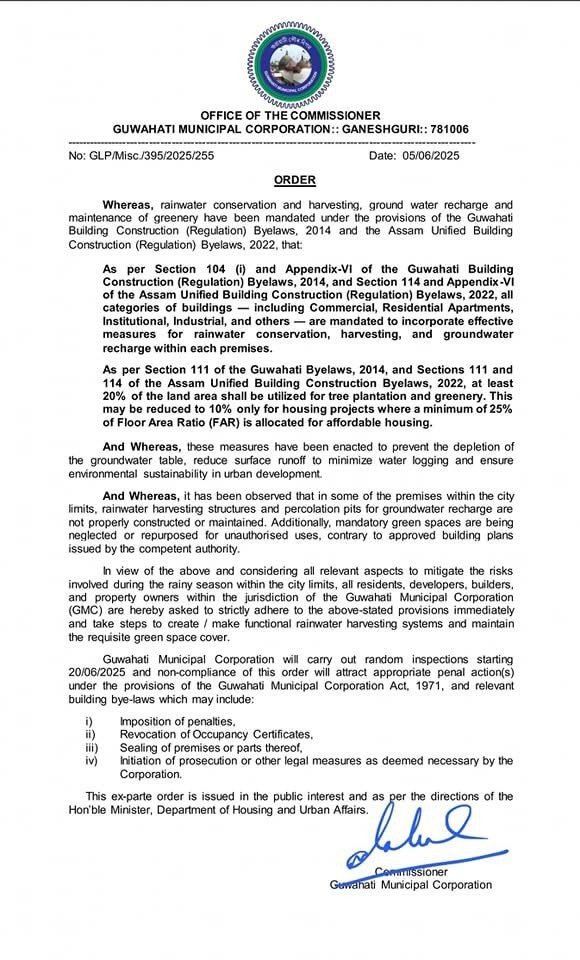The Guwahati Municipal Corporation (GMC) plans to launch a holistic enforcement campaign city-wide from June 20, 2025, to make long-pending but weakly enforced city environment laws effective. The campaign will have two main thrusts: compulsory rainwater harvesting systems and the retention of green spaces in both old and new buildings. This step has been taken considering growing environmental issues in Guwahati—particularly during monsoons—since the city faces problems such as urban flooding, groundwater depletion, and the heat island effect.

Following the Guwahati Building Construction Byelaws, 2014 and the revised Assam Unified Bylaws, 2022, all residential, commercial, institutional, and industrial buildings need to have operational rainwater harvesting systems and create sufficient green spaces on their grounds. Precisely, 20% of the overall plot area should be earmarked for green cover, including trees, shrubs, and open lawns. Where at least 25% of the built-up area is allotted to affordable housing, this condition of green space is relaxed to 10%. Yet, with these provisions being on the books for a number of years now, GMC has noted that many properties, particularly older structures and certain new constructions, have not adopted these requirements, either omitting the installations entirely or employing the specified green plots for additional structures or parking lots.
The inspections are part of a greater plan by the civic body to transform Guwahati into a more sustainable and flood-proof city. Property owners have been served a last notice to voluntarily adhere to the bylaws. After June 20, GMC officials will carry out surprise and random checks in different city zones, and defaulters will face varying penalties. These may range from financial penalties, withholding or canceling of Occupancy Certificates (OC), and even prosecution under local and environmental protection laws.
Authorities have made it clear that this is not merely a matter of punishing defaulters but also raising awareness and promoting voluntary participation in the city’s sustainability agenda. Along with inspections, awareness drives shall be conducted in coordination with local resident welfare associations and builders’ forums to make property owners aware of technical specifications such as roof water harvesting units, recharge pits, and suitable green landscaping.

This enforcement drive also falls in line with a larger campaign initiated by the GMC for tackling urban environmental decay. In recent times, the corporation has accelerated its battle against plastic pollution, particularly the use of single-use plastics that clog city drains and worsen flood situations during the monsoon. In addition, infrastructural work like road-cum-drain systems is being expedited to supplement these green measures by enhancing drainage and minimizing waterlogging in strategic locations.
With monsoon season approaching and environmental stress mounting, this initiative marks a pivotal moment for Guwahati. The onus now lies on property owners, developers, and residents to contribute actively to the transformation. If effectively implemented, the GMC’s June 20 drive could significantly enhance Guwahati’s environmental resilience and set an example for other rapidly urbanizing cities across India.

